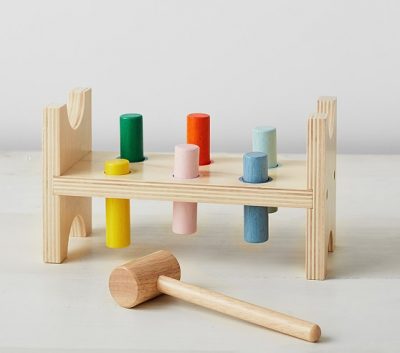Peek inside any toy box and you’re bound to see them — gadgets and gizmos touting educational benefits for babies. There’s the plaything with flashing lights that claims to boost your little one’s language skills. Or the bouncing seat that promises big advancements in gross motor development. Whatever the case, children’s stores are stocked to the brim with toys heralding huge developmental gains for even the smallest of babies, preying on parents’ desires to do right by their children.
visit our PlayHub for tips, tricks, and toys to help you tackle playtime with confidence!
But do any of these toys actually work? Marketers say yes, but mounting evidence suggests otherwise.
“Parents have this idea that if they just put kids in front of an educational toy or program, they’ll strengthen their language skills,” says Emily Patillo, a developmental therapist based in Austin, TX. “The trouble with this, for example, is that language is not one-sided. It requires back-and-forth between baby and caregiver. So these toys that claim to support language development are hardly advantageous because they’re missing that crucial component, which is parent interaction.”
A recent study published in JAMA Pediatrics supports Emily’s views — and takes them one step further. Here, researchers at Northern Arizona University zeroed in on electronic baby toys, positing that not only does this sect of so-called educational toys not live up to the expectations set forth by their marketing departments, but they might even set babies back, developmentally speaking.
After observing 26 parent and infant pairs, the research team concluded that babies who played with flashy, electronic devices — such as those promising to speed up language and cognition — had far less productive play times. They found that, during this play, both parents and babies were less vocal than the pairs who played with more traditional toys.
Translation? Parents and babies both zoned out when presented with toys that blinked and buzzed, leading the team to believe that this category of toy might eventually put the brakes on language development, instead of enhancing it.
“From birth, babies are building the groundwork for language,” Emily explains. “They learn by watching a caregiver’s mouth and facial expressions to see how they produce sounds and words. So while a new parent may not see the profound significance of verbal interaction with a young baby — and might say, let them play with a stimulating device on their own — there’s a lot going on in a baby’s brain that helps to lay the foundation for verbal communication later on. That conversational turn-taking is so important.”
So what is a new parent to do when faced with entertaining a little one? Emily encourages us to ditch the fancy and flashy in favor of simple, old-fashioned toys that foster open-ended play. To this end, she issues a simple guideline: “You don’t need someone else to dictate how your child plays with a toy. Look for an item that offers plenty of options for play. This will help ensure your child uses his or her imagination.”
Looking to stock up on new toys for baby? Emily offers a slew of suggestions, steering you from the overpriced and gimmicky to items that can make the most of your child’s playtime.

Source: life.with.hudson
Instead of pint-sized laptops and cellphones, choose…
Battery-powered replicas of laptops and cell phones can be overstimulating. They provide instant gratification and dictate play for babies. To encourage exploration, discovery, and open-ended play, choose playdough or wooden blocks.

Source: Molly Madfis
Instead of language apps and educational TV shows, choose…
TV, phones, and apps offer one-sided communication that’s not as beneficial as it claims to be. Choose something interactive like books. Books offer plenty of opportunity for communication between caregiver and baby, setting the foundation for teaching language and literacy skills.

Source: Meredith Schock Zimmermann
Instead of flashcards, choose…
Baby flashcards promote rote memorization instead of giving your little one knowledge that can be applied throughout the day. Wondering what to do? Think of flashcards differently. Turn them into something purposeful, interactive, and engaging. If the flashcard has an animal on it that’s also in the nursery, head there and go on a hunt, prodding baby to pick out the matching stuffed animal. This tactic allows your baby to take a learned skill and apply it to a new setting, deepening understanding. Use this approach and your little one involves a variety of senses to better understand a new concept.
Instead of shape sorters with all the bells and whistles, choose…
Shape sorters can dictate how your child plays and don’t offer enough versatility in play options. What should you do instead? Offer up your kitchen cabinets. Let baby stack Tupperware and plastic cups. Stand back and watch as he or she empties your utensil drawer and loads it back up again.
Why? Allowing baby to participate in daily routines and explore everyday materials provides practice with sorting, shapes, and sizes, and problem-solving.
Worried you’ve damaged baby by opening the nursery door to toys that can’t possibly live up to their claims? Relax. “Parents are human and, at the end of the day, we all have to survive,” reassures Emily. “If that means handing over a blinking toy so you can shower in peace, do it. With most things in life, it’s all about finding moderation and balance. The way we approach our babies’ learning and development — and ultimately, the way we parent — shouldn’t be any different.”











